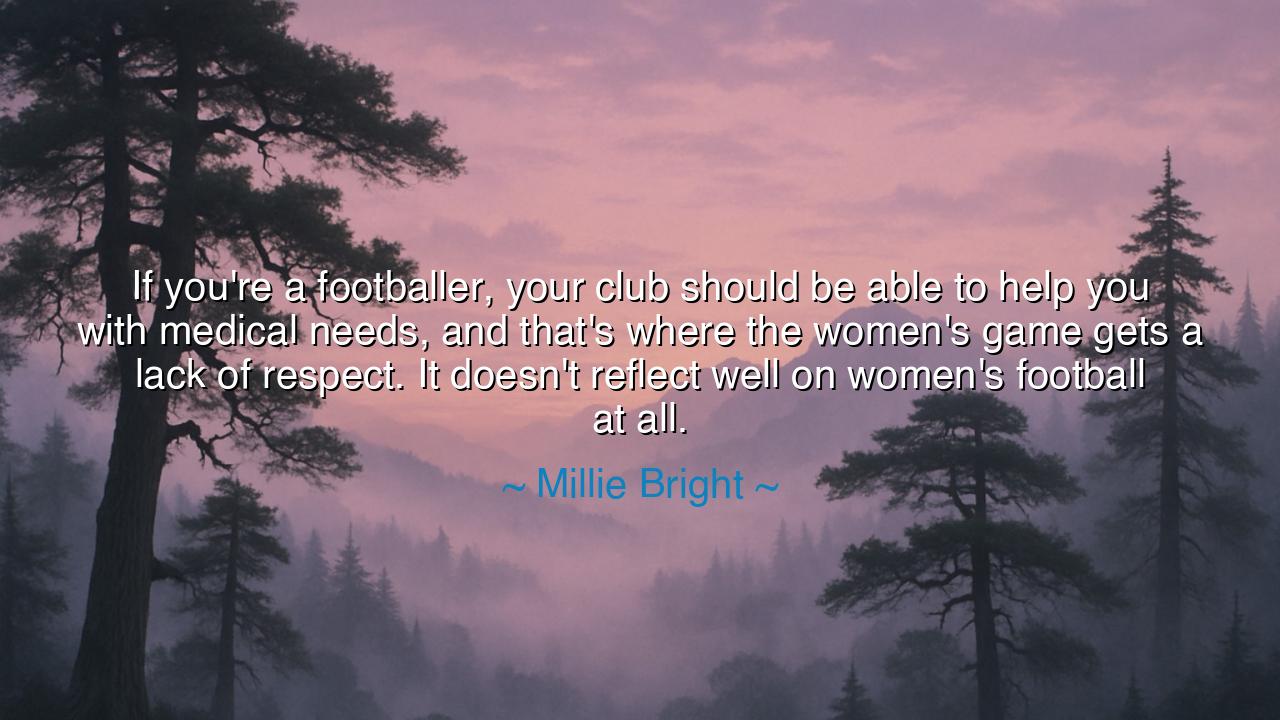
If you're a footballer, your club should be able to help you with
If you're a footballer, your club should be able to help you with medical needs, and that's where the women's game gets a lack of respect. It doesn't reflect well on women's football at all.






The words of Millie Bright ring like a cry of justice echoing through the fields of the beautiful game: “If you're a footballer, your club should be able to help you with medical needs, and that's where the women's game gets a lack of respect. It doesn't reflect well on women's football at all.” These are not words of complaint but of courage—spoken not from weakness but from a warrior’s heart that knows the worth of labor, sacrifice, and equality. Beneath them burns an age-old fire: the struggle of the deserving to be seen, valued, and treated with fairness.
In the ancient times, the poets and philosophers told that a just society is revealed not by how it honors its heroes, but by how it cares for them when they fall. The battlefield of sport is no different. The player, who gives body and spirit for the glory of her club, must be repaid not only with applause but with care—for she has traded fragments of her own flesh for the joy of the crowd. Bright’s words remind us that medical support is not a privilege; it is a duty, sacred and binding, between the athlete and the institution she serves. Where that duty is neglected, honor fades, and the name of the sport itself grows hollow.
In her lament lies a greater truth about the world beyond football—the inequality that shadows women’s sports. Though women have fought their way onto the pitch, their victories are often met with lesser recognition, lesser resources, and lesser protection. Yet their effort is no lesser. Their wounds bleed the same, their endurance shines just as fiercely. To deny them the same medical care or respect is to deny the spirit of the game itself, which was born not from dominance but from unity and the pursuit of excellence.
Recall the tale of Megan Rapinoe, who tore her ACL early in her career. In the shadow of injury, many believed her time was over. Yet through resilience, she rose again—not because her body was invincible, but because she found care, support, and a will unbroken. Imagine, then, the countless unnamed women who were not afforded such recovery, who bore their pain in silence because their clubs did not see their worth. Each forgotten injury, each unhealed wound, is a scar upon the conscience of sport itself. Bright’s voice rises for them—for every player whose struggle was ignored by those who should have been her shield.
In truth, her message reaches beyond the stadium. It is a call for respect—a respect that must live not in words or slogans, but in systems and deeds. For what is respect if not care in action? The ancients would say that to respect another is to honor the divine spark within them—to recognize their equal claim to dignity, safety, and wellbeing. When a woman steps onto the field, she carries not only her own dreams but the hopes of generations who fought for the right to stand there. To neglect her care is to betray them all.
And yet, Millie Bright does not speak in bitterness; she speaks as a guardian of hope. Her words are not accusation—they are invitation: to rise, to reform, to make the world of sport whole. Just as the body must be healed for the athlete to perform, so must the structure of the game be healed for the spirit of fairness to thrive. To build medical programs for women’s teams, to fund physiotherapy, to ensure equal treatment—these are not acts of charity, but acts of justice.
So, my child of the future, learn this truth well: greatness does not lie only in victory, but in how we care for those who strive. Let no woman’s pain be dismissed as lesser, no athlete’s need be treated as optional. Whether you are a leader, a fan, or a fellow player, let your respect be proven through your compassion, your advocacy, your action. For sport, at its truest, is not a contest of strength—it is a covenant of humanity.
And in this covenant, Millie Bright’s words shall stand as both flame and mirror: a flame to ignite change, and a mirror to remind us what kind of world we wish to build—one where every player, every woman, every dreamer who gives their all, receives in return not neglect, but the full measure of care and honor they have earned.






AAdministratorAdministrator
Welcome, honored guests. Please leave a comment, we will respond soon